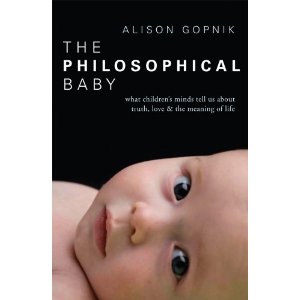A unique set of influences
14 april 2010 | In Books parenting Psychology Self-indulgence | Comments?In one of the early notebooks in which I used to put the kind of thought, rants and musing that nowadays makes it into this blogish existence I made some sort of remark about how to overcome the anxiety of influence; the suspicion that all ones work is somehow derivative. ”One can at least aspire” I wrote (or something like that, I obviously didn’t bother to actually find the thing. It’s a notebook, for crying out loud. It doesn’t even have a ”search” function) ”One can at least aspire to be the result of a unique set of influences”. In other words: it doesn’t much matter whether one is little less then the effect of what one has read, seen, heard etc. since the longevity of life in the plastic state makes sure that some originality will ensue even from that process. In addition: to track down the complete set of sources that ”made” a particular author/thinker is excellent fun. One can even toy with that sort of thing in ones writings, provide hints and such (misleading ones, if one wants to be clever).
Anyway, I’m going somewhere with this. Oh, yes: I find that most things I write in hindsight quite clearly is the result of what I was interested in at the time, even when those things were not obviously related to begin with. Thus, for instance, it is highly unlikely that my dissertation would have gone down the way it did, were it not for the fact that I happened to be into cognitive science just before I got the job (much to the dismay of my supervisors). The sort of value theory I was into before that was much more of a dry, conceptual analysis kind of thing.
So I’m pretty sure that something interesting will come from my current preoccupation with the two subjects of Psychopathy and child (infant, actually) psychology. It’s not hard to find a link, obviously: developmental processes are key in both areas, but I’m very likely to make a big point out of this, merely for the reason that these are the things that interests me now.
For instance: one current trend in chid psychology is to stress the wide, undiscriminating attention of infant and toddler (more of a lamp, than a spotlight) which make them better than adults at noticing task-irrelevant features. Psychopaths, according to another book I’m reading, are quite the opposite: one of the cognitive peculiarities of psychopath is their ability to focus, and their inability to remember task-irrelevant features. As pointed out in the previous post, attention may suffer when the amount of information increases, but the reverse is true as well. The inability to shift attention when previously irrelevant information becomes relevant, or shows you that a shift is needed, is clearly a problem in a variable environment, such as our, social one. Infants are in the process of finding out what is relevant, and thus need not to focus attention just yet.
My third current interest is in the cognitive science of literature. I’m likely to find a way to make that relevant to the project as well.

(Currently reading)